Got questions about culinary school? We’ve got answers!
Choosing a postsecondary school is a big decision. And it’s natural to feel overwhelmed when faced with myriad options of schools, programs, and degrees.
Close those browser tabs. Consider this your one-stop introduction to the Auguste Escoffier School of Culinary Arts. Our guide can show you who Auguste Escoffier was, our school’s values, how we can help prepare students for a career in the culinary arts, and what might make us different from other culinary schools out there.
The Origins of Escoffier
Before Escoffier was a reputable culinary school, it was the name of a person. Get a bit of history on Georges Auguste Escoffier, the father of French haute cuisine, and the school that bears his name.
Escoffier, The Legendary Chef
From his first culinary apprenticeship at the age of 13, our namesake Auguste Escoffier threw himself into kitchen work. By age 18, he had become commis rotisseur (junior roast cook) at the renowned Le Petit Moulin Rouge in Paris. In 1890, he brought his talent to The Savoy in London, and later to the new Carlton Hotel.
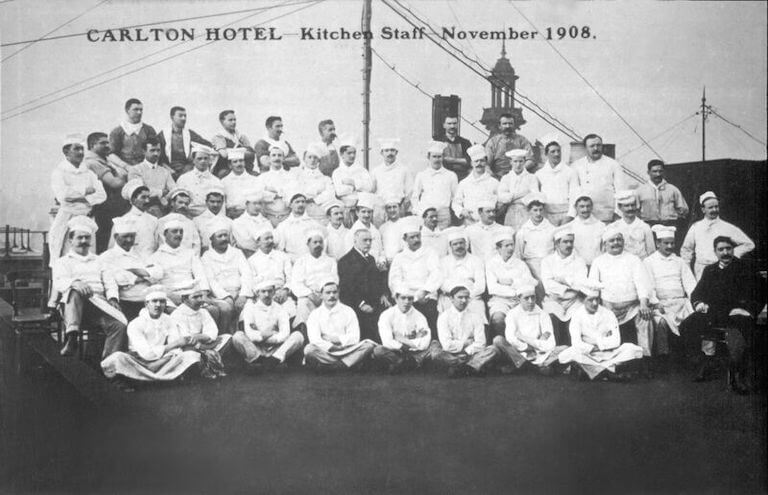
Auguste Escoffier (center) with the kitchen staff of the Carlton Hotel
Escoffier invented some 5,000 recipes and published the classic Le Guide Culinaire textbook which was the guide to French cuisine. He also revolutionized the way a kitchen is managed. As a former soldier, he saw an opportunity for increased order and efficiency in the kitchen. Consequently, he came up with the brigade de cuisine system and the concept of mise en place, which are both still in use today. He left an indelible mark on the culinary industry and is considered one of the most influential chefs to have ever lived.
Escoffier, The Modern School
So what does a great French chef who was born over 175 years ago have to do with a modern-day culinary school based in the United States?
Escoffier’s founder, Jack Larson, envisioned a school that would disrupt the traditional culinary school approach, eventually including an online learning model that made culinary school accessible to more students.
Interested in paying tribute to Auguste Escoffier, Larson reached out to Michel Escoffier, the late chef’s great-grandson, to see if he wished to get involved. Michel Escoffier was thrilled about the idea and became a member of the Escoffier National Advisory Board, where he continues to contribute to the school’s mission.
The school founded its two campuses—one in Austin, TX and the other in Boulder, CO—in 2010. Not long after that, Escoffier’s Boulder campus debuted its online culinary certificate program. Soon, we were offering degrees and diplomas entirely online with in-person industry externships.
What Can Students Study at Escoffier?
Today, Escoffier offers eleven programs across six different disciplines. Each program has been carefully designed to help prepare students with the skillset for an entry-level job in their chosen field.
Many of our programs are offered in both diploma and associate degree formats. Both can include hands-on training as well as business-focused education. Associate degree programs also include some additional courses. For example, the math requirement in some of our Austin-based associate degree programs is satisfied by a College Algebra course that introduces students to managerial accounting concepts and how they apply to specific operations in the hospitality industry.
Many students choose to first earn their diplomas, and then continue on in the associate degree program, as their credits can carry over from the diploma into the degree. While each program has its own specially designed curriculum, they all end in one or two in-person industry externships, giving students the opportunity to apply their skills to a professional setting.
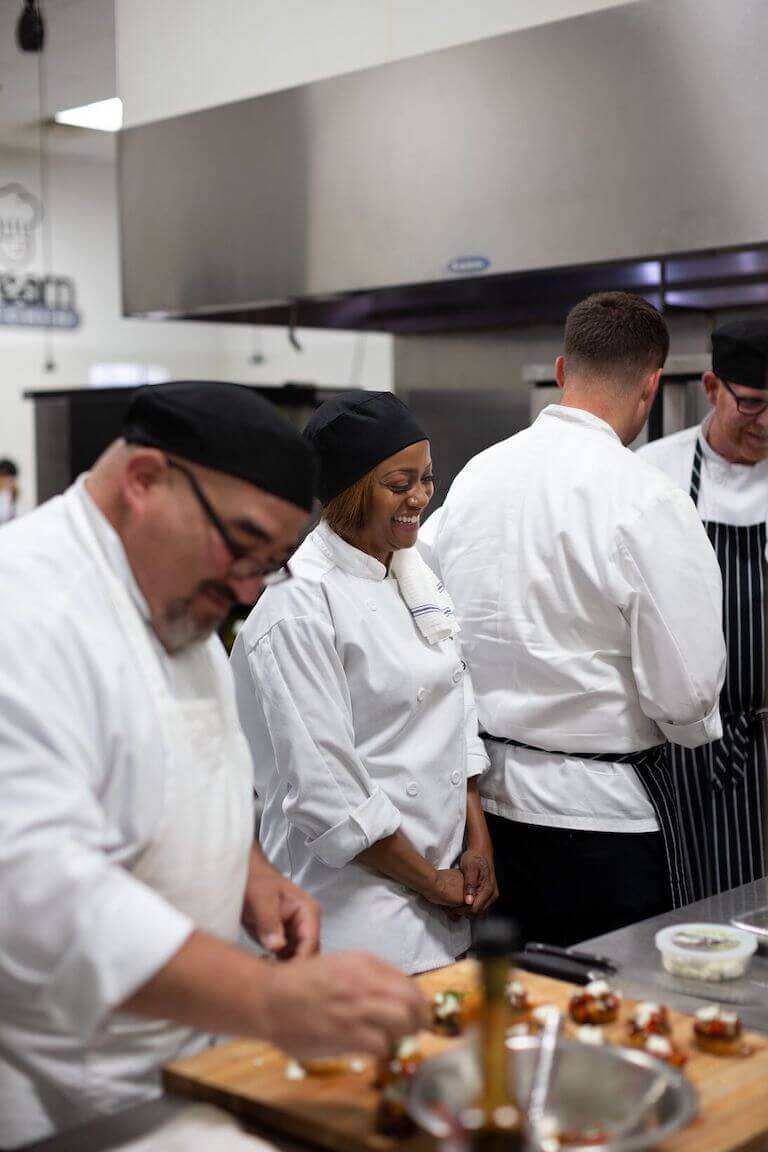
Escoffier Graduate Tiffany Moore smiling with her classmates during her time at school
Culinary Arts at Escoffier
Escoffier’s Culinary Arts curriculum is designed to combine French culinary techniques, practical skills, and a useful business foundation. Depending on the program, students may complete coursework in professional cooking methods and knife skills, menu design and management, sustainability and world or regional cuisines, culinary entrepreneurship, and more. These programs can help students to excel both in the kitchen and in the overall workplace.
Escoffier’s Culinary Arts Programs
- Diploma in Culinary Arts (available at the Austin and Boulder campuses, and online)
- Associate Degree in Culinary Arts (available at the Austin and Boulder campuses, and online)
Baking & Pastry Arts at Escoffier
For prospective students who dream of a career in Baking and Pastry Arts, Escoffier’s coursework combines the math and science of the baking profession with the decorative work that makes desserts such a treat. Depending on the program, students may also explore the business side of baking, with coursework in foodservice management and cost control.
Escoffier’s Baking & Pastry Arts Programs
- Diploma in Pastry Arts (available at the Austin and Boulder campuses, and online)
- Associate Degree in Baking & Pastry (available at the Austin and Boulder campuses, and online)
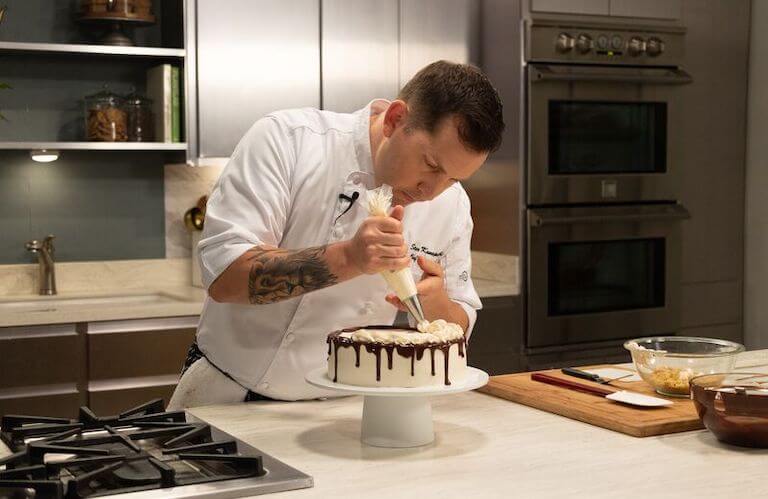
Chef Instructor Steve Konopelski demonstrating a cake decorating technique
Plant-Based Culinary Arts at Escoffier
Long-considered supplemental to a meal, veggies take center stage in Escoffier’s Plant-Based Culinary Arts programs. Students may explore a variety of methods for plant-based cooking, including ingredient substitutions, plant-based baking and pastry, and using seasonal ingredients.
They may also explore techniques for managing costs, tracking inventory, and leading their employees, to become more effective food service managers.
Escoffier’s Plant-Based Culinary Arts Programs
- Diploma in Plant-Based Culinary Arts (available online)
- Diploma in Plant-Based Cuisine (available at the Boulder campus)
- Associate Degree in Plant-Based Culinary Arts (available online)
“I’ve had such an amazing experience. It’s been a challenge but the things we learn hands-on and in the reading, lectures, and live classes…GOLD. I’m even informing my vegan friends of ideas, concepts, and techniques they didn’t know about. I can’t wait to graduate and expand my career.”*
Sophia San Roman, Escoffier Plant-Based Culinary Arts Student
Holistic Nutrition and Wellness at Escoffier
Whether the student wishes to pursue a career as a health coach, holistic nutritionist, or a health-minded chef, an education in Holistic Nutrition and Wellness from Escoffier can lay the foundation. Students may find a combination of science-backed nutrition education, coaching techniques, and technical cooking skills that they can apply to a career in the fast-growing wellness industry.
Escoffier’s Holistic Nutrition and Wellness Programs
- Diploma in Holistic Nutrition and Wellness (available online)
- Associate Degree in Holistic Nutrition and Wellness (available online)
Hospitality & Restaurant Operations Management at Escoffier
For those who love hospitality but prefer to work with people rather than food, education in Hospitality and Restaurant Operations Management could be the place to start. This business-forward program focuses on analyzing data to make smarter decisions, training and managing employees, professionalism and guest services, and different hospitality operations.
Escoffier’s Hospitality Program
- Associate Degree in Hospitality & Restaurant Operations Management (available online)
Food Entrepreneurship at Escoffier
Aspiring business owners need to conquer a different set of skills than chefs or managers. Escoffier’s Food Entrepreneurship program is designed to help students build those skills. With coursework in business essentials and planning, marketing, operations, and more, students may be prepared for careers starting or running small food businesses with an industry-specific education to support them.
Escoffier’s Food Entrepreneurship Programs
- Diploma in Food Entrepreneurship (available online)
- Associate Degree in Food Entrepreneurship (available online)
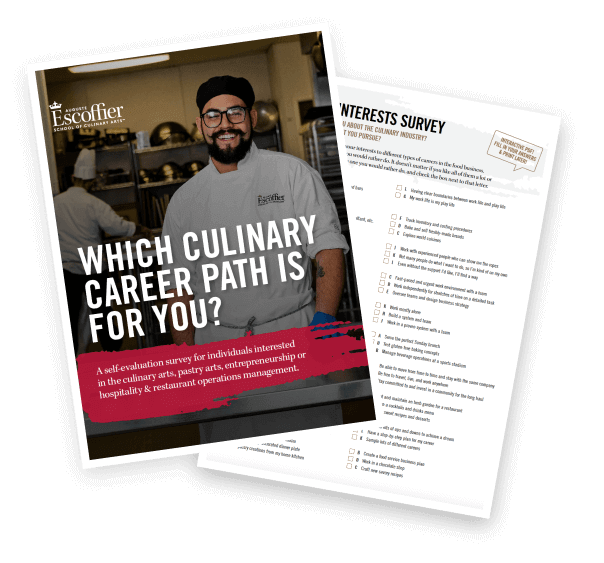
Take the Culinary Career Survey
We’ve compiled a checklist of all of the essential questions into one handy tool: career options, culinary interest surveys, educational opportunities, and more.
Online Programs at Escoffier
As you saw above, most Escoffier programs are available both on-campus and online.
Escoffier is a pioneer in online culinary education, having been the only U.S. accredited institution offering 100% online degrees with culinary classes and hands-on industry externships.** Rather than simply recording on-campus classes and making them available to online students, we have an entire curriculum designed exclusively for online learning with a dedicated faculty—with concepts scaffolded to build upon one another.
**Our Boulder, CO campus is the only accredited institution in the United States to offer both fully online diploma and degree programs with culinary classes and hands-on industry externships. We are accredited by ACCET – A Partnership for Quality®. ACCET is listed by the U.S. Department of Education as a nationally recognized accrediting agency.
The online culinary school curriculum at Escoffier includes live and archive video class sessions, pre-recorded and live cooking demonstrations, reading assignments, cooking theory lessons, and labs with cooking assignments. As long as students meet their weekly program deadlines, they can complete this coursework whenever it’s convenient for them.
Take a peek at how online education at Escoffier works.*
*Information may not reflect every student’s experience. Results and outcomes may be based on several factors, such as geographical region or previous experience.
Students can get personal feedback on each assignment from their Chef Instructors, based on their photos and written documentation. And with no commute, no need to relocate, and the flexibility to complete each week’s coursework on your own schedule, students may find that online culinary school can give them the opportunity to get an education that would otherwise be out of reach.
Online students can expect to spend 15-23 hours per week on school-related activities, depending on the program, credential, and personal pace.. Most online programs take 60 weeks to complete. The exceptions are the Associate of Occupational Studies Degree in Plant-Based Culinary Arts, the Associate of Occupational Studies in Food Entrepreneurship, and the Associate of Occupational Studies Degree in Holistic Nutrition and Wellness, which are 84-week programs.
“I love Escoffier! Online is a lot more hands-on than people think. My chefs are always right there to help me with any questions I have. And when they grade assignments, they see every step and can help determine what you did right, what you did wrong, and what you need more practice on. You literally have a team of people there for you to help you every step of the way.”*
Brianna Borroughs, Escoffier Online Culinary Arts Graduate*Information may not reflect every student’s experience. Results and outcomes may be based on several factors, such as geographical region or previous experience.
On-Campus Programs at Escoffier
For students who prefer an in-person learning environment, Escoffier offers programs in culinary arts, baking and pastry arts, and plant-based cuisine at campuses in Austin, Texas, and Boulder, Colorado (different programs are offered at different campuses; please check the specific campus page for details.)
On-campus coursework is divided into both classroom lectures and kitchen labs. With small class sizes, these class types can give students personalized attention from their Chef Instructors, as well as the opportunity to ask plenty of questions.
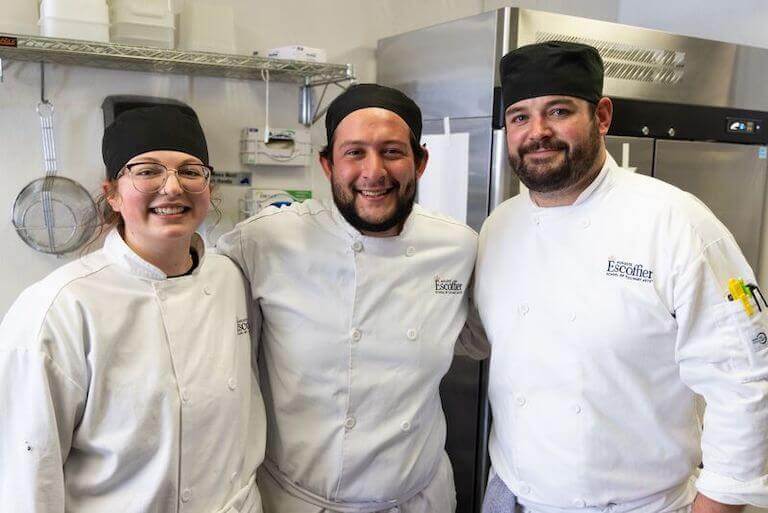
Students at Escoffier’s Boulder campus
There’s more to do in Austin and Boulder than just cook! These two food-focused towns can give students the chance to explore local farms, a wide variety of restaurants and foodservice operations, and food festivals and events throughout the year. Some students even choose to volunteer at local events, allowing them to network and learn from experienced local chefs.
Austin student Katie Sualog, for example, got to meet famous BBQ pitmaster Rodney Scott when she volunteered at the Austin Food & Wine Festival.
Austin’s campus also includes an Agricultural Learning Center, where students get the chance to grow, harvest, and cook with seasonal fruits, vegetables, and herbs.
Boulder’s campus sits at the foothills of the Rocky Mountains and is within a short distance of local farms, artisan food producers, and of course, plenty of excellent restaurants.
What Sets Escoffier Apart from Other Culinary Schools & Programs?
All culinary education is not the same. Whether you choose to study at a four-year college or university, a specialized culinary school, or a community college, you’ll find a different atmosphere, curriculum, and resources available.
Here’s what you can expect to find at Escoffier.
A Modern Take on French Cuisine
Auguste Escoffier himself said, “Cooking, like fashion, must evolve with time and take into account the changes in peoples’ lives.” Today’s cooks and chefs have different tools and they’re cooking for a different palate than the classic French chefs of the past. True to our namesake, the Escoffier approach is based in French cuisine, updated for the modern world.
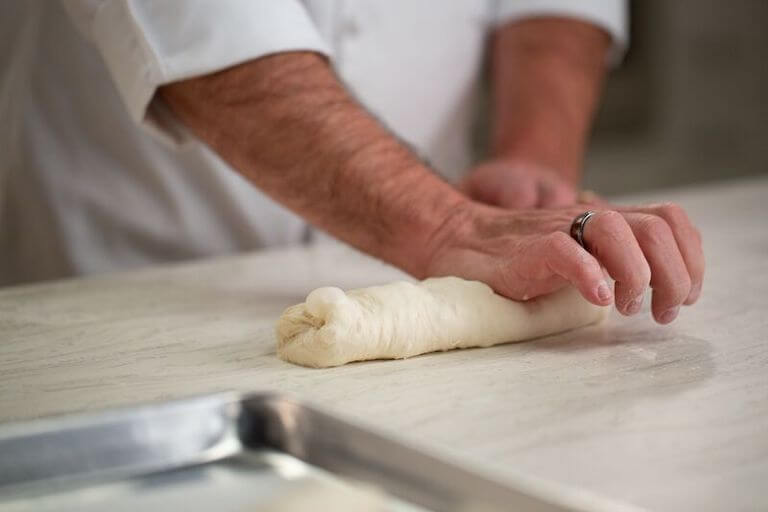
Shaping baguettes
Dedicated Chef Instructors
A school is only as good as its teachers. Escoffier employs over 120 professional Chef Instructors across our two campuses, including online programs. Some of these instructors have reached the top of the culinary world. From working at Michelin-starred restaurants to starting their own culinary businesses to writing cookbooks, this team has probably seen it all and done it all.
Pastry school students may learn the secrets to the macaron with Certified Master Baker Colette Christian. Culinary arts students may practice proteins with Certified Executive Chef® Scott Cohen. Hospitality & restaurant operations management students may unravel cost control with Chef Vicki Berger—she has an MBA and a Master of Education degree!
“The quality of Chef Instructors is so good. They really join hands with you one-on-one. I could reach out to any Chef Instructor whenever I needed. It’s never-ending, I keep learning each and every time I am in need of knowledge from Escoffier.”*
Chef Arnold Safari, Escoffier Online Culinary Arts Graduate*Information may not reflect every student’s experience. Results and outcomes may be based on several factors, such as geographical region or previous experience.
Beyond education and certifications, Escoffier’s Chef Instructors have a breadth of experience and accolades that enhance our well-designed curriculum. Chef Albert Schmid has won three Gourmand Awards for his cookbooks, and has cooked professionally for the U.S. Surgeon General, state governors, and Olympic gold medalists. Chef Eric Jenkins is a former White House chef. Chef Billie Sutton has worked as a food stylist for television shows Westworld and NCIS, plus the film The Call of the Wild. And Chef Jesper Jonsson has worked in eight Michelin-star restaurants and was welcomed into the ranks of the Disciples d’Escoffier.
Chef Instructors may make themselves available to students before and after class and are committed to their students’ success. Online Culinary Arts graduate Quinten Adcock recalls, “The instructors are like rockstars. They truly care about you as a student and as a person. I opened a food truck while enrolled and the long hours had me falling behind in my classes. My instructor called me personally and we worked on balancing the schoolwork with my work schedule AND she helped me with great advice for my business.”*
*Information may not reflect every student’s experience. Results and outcomes may be based on several factors, such as geographical region or previous experience.
The Ability To Study Online
Escoffier pioneered the field of online culinary education, beginning the program in 2015.
There is much more to creating an effective online learning experience than simply taking an in-person curriculum and putting it on the internet. With careful attention paid to the student experience, Chef Instructor feedback, and accessibility to our students around the world, Escoffier’s programs are thorough and extensive.
A Focus on Sustainability and The Farm to Table® Experience
The culinary and hospitality industries have the potential to be wasteful. But they don’t have to be! Escoffier’s culinary programs may include coursework focusing on sustainability, helping students keep an eye on reducing waste and using seasonal, local ingredients when possible, helping to reduce emissions produced during transport.
Culinary Arts students may also participate in the Farm to Table® Experience. This unique course includes classwork in local ingredients and seasonality. It may also send on-campus students to a local farm or artisan food production site so they can better understand the work that goes into creating a pound of beef, a quart of milk, or a jar of giardiniera.
Online students may have the opportunity to visit farms or food artisans.*
*Information may not reflect every student’s experience. Results and outcomes may be based on several factors, such as geographical region or previous experience.
A Military Friendly® Designation
Escoffier Austin and Boulder (including the online programs) is proud to have been recognized as a 2023-2024 Military Friendly® School. This designation shows that Escoffier is committed to providing high levels of student support and satisfaction to our military and veteran students and their families.
Whether the student is using their GI Bill® benefits to fund culinary or baking school on-campus, or completing their program online while serving on active duty, military students may find the origins of their next act at Escoffier.
Support from Success Coaches
With Escoffier students coming from all walks of life—straight out of high school, starting a second or third career, embarking on a post-military career—some find they need a bit of extra support.
For students, that support comes in the form of a dedicated Success Coach. These guides (along with the Chef Instructors) keep an eye on their students. If anyone seeks help, the Success Coach is there to check in and help the student overcome challenges. Coaches may help students to connect with community resources, or to break down a problem into smaller, manageable parts.
“I struggled with school in the past for years, but with the help of Career Services and my Success Coaches, I graduated on time. I put a goal in place of getting 95% or higher in each of my baking courses and I did exactly that.”*
Kellie Trimble, Online Pastry Arts Graduate*Information may not reflect every student’s experience. Results and outcomes may be based on several factors, such as geographical region or previous experience.
Accreditation
Accreditations are endorsements from national and regional organizations that certify the school as meeting certain standards of education and quality.
Not all private culinary schools are accredited, which can leave students unsure about the level of education that they’re receiving. Auguste Escoffier School of Culinary Arts is a nationally accredited institution. We are also a member of the International Association of Culinary Professionals, the National Restaurant Association, StateFoodSafety and the World Association of Chefs’ Societies.
How Can You Pay for Your Escoffier Education?
The cost of culinary school should not put the option to attend out of reach. Escoffier’s programs can be affordable***, and financial aid and scholarships may be available to those who apply and qualify.
***Consider your situation and resources to determine what is affordable and on budget, for you.
Tuition costs vary based on the program and campus where you choose to study. Tuition rates are subject to change. Check Escoffier’s Tuition & Fees page for up-to-date pricing.
“The cost for Escoffier is substantially less compared to the other schools I researched.”*
Brent Unruh, Culinary Arts Graduate*Information may not reflect every student’s experience. Results and outcomes may be based on several factors, such as geographical region or previous experience.
So, how can you pay for it?
Financial Aid
Since Escoffier is an accredited institution, our students may qualify for federal financial aid that would be unavailable at an unaccredited school. That means that students may be able to pay for culinary school with federal student loans or other types of financial aid if they apply and qualify.
In fact, most Escoffier students who entered postsecondary education for the first time received some financial assistance in 2021-22 for those who applied and qualified.†
Scholarships and Grants
Some students also receive scholarships and grants to help pay for their education. These types of gift-aid may be one-time, or they may be recurring throughout your education. And the best part—they don’t have to be repaid! Any scholarships or grants a student receives can reduce the amount they have to pay out of pocket, either at the time they get their education or later, when they repay their student loans.
Escoffier graduate Wyl Lima received a James Beard Scholarship that helped him to pay off his loans and gave him a chance to meet Chef Curtis Duffy—and to work at his Michelin-starred restaurant, Grace!
Meet Escoffier graduate and James Beard Scholarship recipient Wyl Lima.*
*Information may not reflect every student’s experience. Results and outcomes may be based on several factors, such as geographical region or previous experience.
Check our Essential Guide to Culinary Scholarships to learn about need-based, merit-based, and competition-based culinary scholarships.
What Happens After Culinary School?
The end of culinary school could be the beginning of your next chapter. Whether you’re using your new degree or diploma to further a career already in progress, or taking the opportunity to get your first job as a professional cook, you may be taking an exciting next step.
Some students find that their culinary externships could transition into permanent jobs. Other graduates fulfill their dreams by going out on their own.
Graduate Wyl Lima, for instance, has climbed the ranks through a number of high-end restaurants, including 3-Michelin starred Grace, 2-Michelin starred Acadia, and Michelin-starred Temporis.
Escoffier’s Career Services
While your formal education at Escoffier may end within two years or less, our career support doesn’t. Escoffier’s Career Services assistance continues after graduation. Alumni can access help with their job searches, resume writing assistance, interview preparation, and industry referrals.
This resource may provide the connections graduates are looking for to secure that interview or stagiaire and take the next steps in their careers!
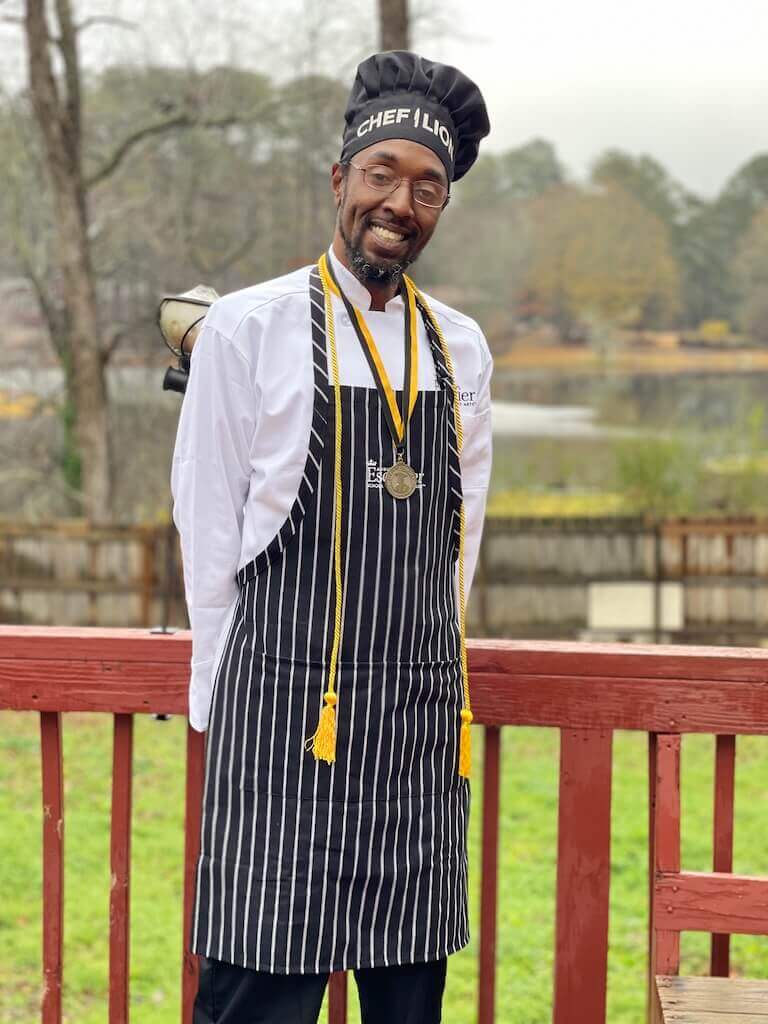
Escoffier graduate Lyonell E.
Escoffier’s Featured Employers
Escoffier has strong relationships with many businesses in the culinary and hospitality industries. These featured employers may be sources of externships or job opportunities for our graduates. These employers include traditional restaurants, hotels, resorts, cruise lines — plus some fantastic independent restaurants and bakeries across the country.
Escoffier’s Alumni Association
As you approach graduation or thereafter, you can also join the Escoffier Alumni Association, where you can connect with fellow graduates, see what they have been up to, and stay in touch. This can allow you to leverage your professional network and get introduced to people you may not know yet.
With events, mentorship opportunities, and more, the Escoffier Alumni Association is a fantastic ongoing resource throughout your culinary journey.
How to Apply to Escoffier
What are the Requirements for Application?
In order to apply to Escoffier, prospective students must meet some minimum eligibility requirements.
At the Boulder Campus (including Online Programs)
- Must be a minimum of 16 years of age (with permission of parent or guardian if under 18)
- Application for Admission
- AESCA Enrollment Agreement (inclusive of written permission of parent or guardian if under 18)
- Proof of high school graduation or equivalent (must be obtained through one of the following):
- High school diploma or transcript
- High school equivalency exam: GED, HSED, HiSet, or TASC
- Documentation demonstrating that the student has passed a state-authorized examination that the state recognizes as the equivalent of a high school diploma
- Official college transcript from a completed Associate or higher degree program from an accredited institution
- 60 completed college semester credits or 90 completed college quarter credits from one accredited institution, or
- Homeschool documentation as required by local and or state agencies, not limited to the following: notification to the required agency, academic transcripts, and proof of graduation
- For U.S. veterans, DD-214 which indicates high school equivalency
- Admissions interview
- Application fee (see Catalog Addendum for current fee) or approved Fee Waiver and documentation¹
- FERPA Release Form
At the Austin Campus
- Application for Admission
- AESCA Enrollment Agreement (with permission of parent or guardian if under 18)
- Proof of high school completion or equivalent:
- High school diploma
- High school equivalency exam: GED, HiSet, or TASC
- State-approved homeschool certificate of completion
- Official college transcript from a completed associate or higher degree program²
- For U.S. veterans, DD-214 which reflects high school equivalency
- Admissions interview
- Tour of facility
- Record of previous education & training (CSC-010)
- Receipt of Enrollment Policies (CSC-005)
- Information Release Form (FERPA)
What Steps Must Students Take Before They Can Begin Classes?
Applying to Escoffier is a straightforward process. We usually recommend that students begin by filling out our online information request form. Then, someone from our Admissions Department will contact you to discuss your goals and the right program to help you achieve them.
After that, it’s just a few steps to the first day of class!
Step 1: Complete an Admissions Interview
After completing the information request form, prospective students will be contacted by an Admissions Representative to discuss their goals and assess their aptitude for success at Escoffier.
Step 2: Fill Out An Online Application Form
Escoffier’s online application form is convenient and user-friendly. Most students can have it completed in about 10 minutes. Prospective students may also need to pay a $25 Application Fee, or submit a Fee Waiver, and then sign an Enrollment Agreement indicating their start date (see Supplemental Catalog or Catalog Addendum for current fee).
Step 3: Submit Additional Documentation
This includes a photo ID and proof of high school completion or equivalent, such as a diploma, GED, or state-approved homeschool certificate of completion. There may be additional documentation necessary, like the FERPA Information Release Form or Record of Previous Training (CSC-010) if applicable. Different campuses may have different documentation requirements, so check your paperwork carefully!
Step 4: Work on Securing Financial Aid
Throughout the enrollment process, students may choose to work with Escoffier’s Financial Aid department to secure student loans, grants, and scholarships to fund their programs. They begin by filling out the Federal Application for Financial Student Aid (FAFSA®), which will determine their eligibility.
Step 5: New Student Orientation or Tour
Once students are enrolled, they complete a new student orientation (either in person or online, depending on the program). After all this is complete, they’ll be ready to begin class!
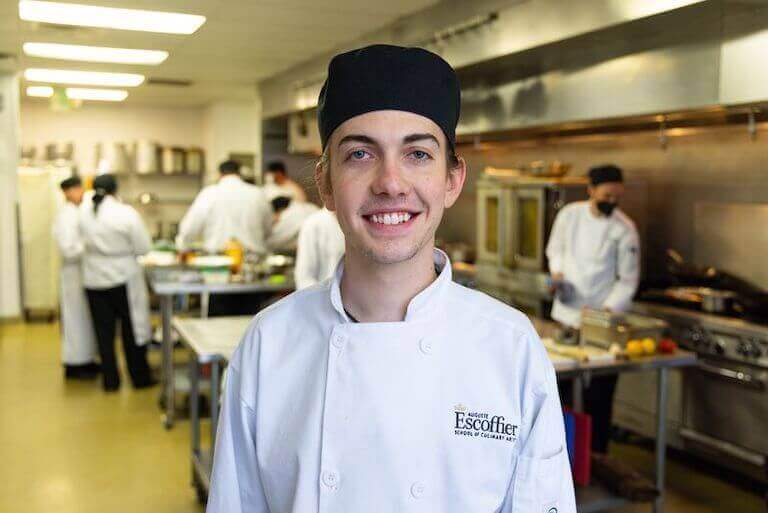
What Tools Might Students Need to Begin Their Programs?
On-campus culinary students are expected to wear their clean chef’s coat, pants, apron, and skull cap to all their cooking classes. Online students receive the same uniform (excluding the pants) which they must wear during live class sessions and while completing their cooking assignments. This gets them in the habit of presenting a professional appearance, which is a requirement in most working kitchens.
Students may also receive a toolkit based on their programs, for example, the Culinary Arts online toolkit may include:
- Scale
- Chlorine test strips
- 3.5” Paring knife
- Digital probe thermometer & timer
- Pastry bag
- 8” Chef’s knife
- Plastic bowl scraper
- Double zip case
- Y-Peeler
- Mercer Rules ruler
- 10” German Steel Sharpener
- High-temp stirring spoon
- Cutlery tube set
- 6” Boning knife
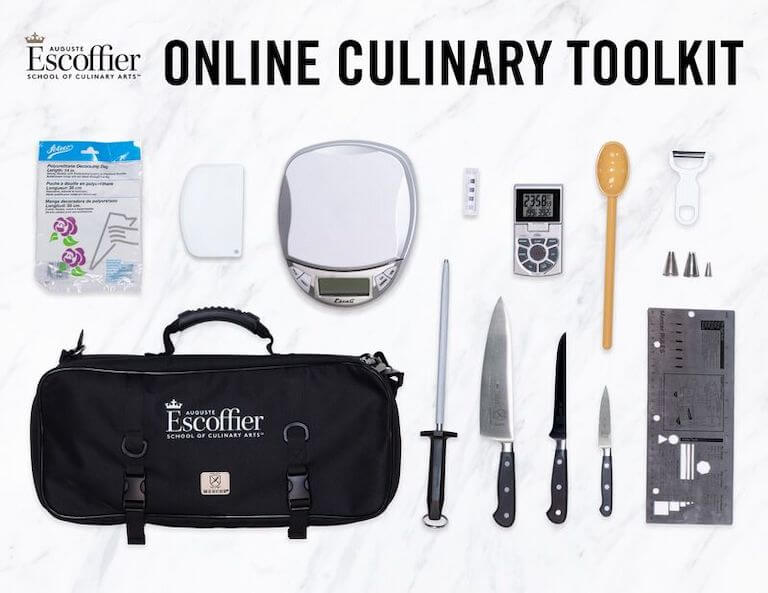
The Baking & Pastry online utensil kit may include:
- #907 Flower Nail Tip
- 1? Pastry Brush
- 10 Plain Decorating Tips
- 10 Star Decorating Tips
- 10? Piano Wire Whip
- 12? Wavy Edge Slicer
- 14? Polyurethane Pastry Bag
- 3.5? Paring Knife
- 4 1/4? Offset Spatula
- 8? Chef’s Knife
- 8? Offset Spatula
- Bench Scraper
- Chlorine Test Strips
- Digital Probe Thermometer
- Double Zip Case
- Escali Pico Scale
- Fine Zester
- Large Scraper (Heat Resistant)
- Pastry Tube Set
- Plastic Bowl Scraper
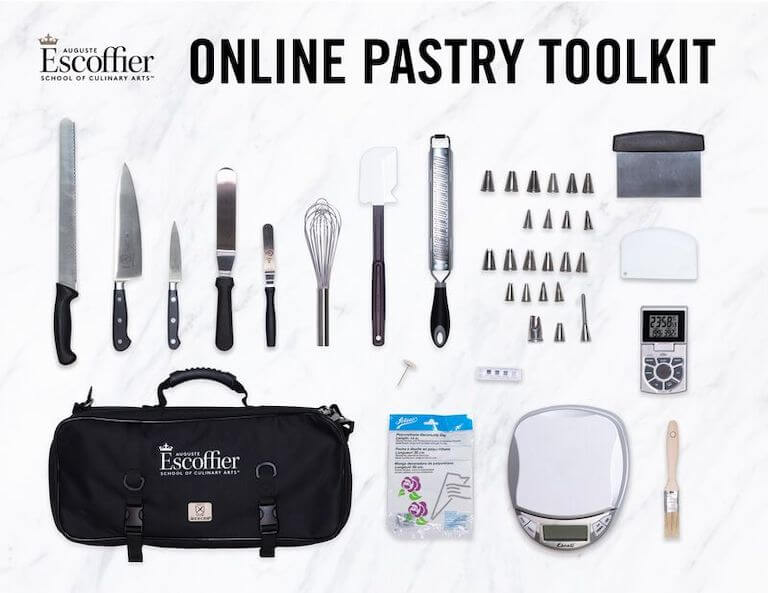
These tools can help students begin their programs with a reliable set of chef’s tools, while their Chef Instructors provide the necessary instruction in how to use them!
Ready for Escoffier 102?
Maybe it’s time to stop dreaming and start doing! That may mean it’s time to start the application process. You can apply online in about 10 minutes, or contact our Admissions Department so they can walk you through the process and answer your questions.
You can also talk to the Student Financial Aid department, there to help students investigate all of the avenues to funding their education. Get started today!
To learn more about what it’s like to attend culinary school, try these articles next:
- 5 Important Things to Know Before Starting Culinary School
- What Are the Types of Culinary Degrees and Diplomas?
- The Pros and Cons of Vocational School: Is It Right For You?
***Consider your situation and resources to determine what is affordable and on budget, for you.
†76% of Austin students and 54% of Boulder students who entered postsecondary education for the first time received some financial assistance in 2021-22 for those who applied and qualified. College Navigator, National Center for Education Statistics.
¹Application fee waivers are available for students that have previously attended a licensed and accredited program at Auguste Escoffier School of Culinary Arts, Active and Honorably Discharged Military Personnel, their spouse and children (acceptable military documentation includes but not limited to: DD214, VA Certificate of Eligibility (COE), membership card in the American Legion or Veterans of Foreign Wars – excluding auxiliary member, LES/Leave and Earnings Statement, a letter from Commanding Officer for active-duty members only, or other official documentation indicating Honorable Discharge or Active Duty status), employees of approved educational partners, those with high school-issued waivers where applicable (distance learning) or high school students enrolling in programs requiring an application fee.
All documents submitted to the institution become records of Escoffier and original documents cannot be returned to the sender or sent to a third party
²Degree must be in a program that fully matriculates into a bachelor’s level program.

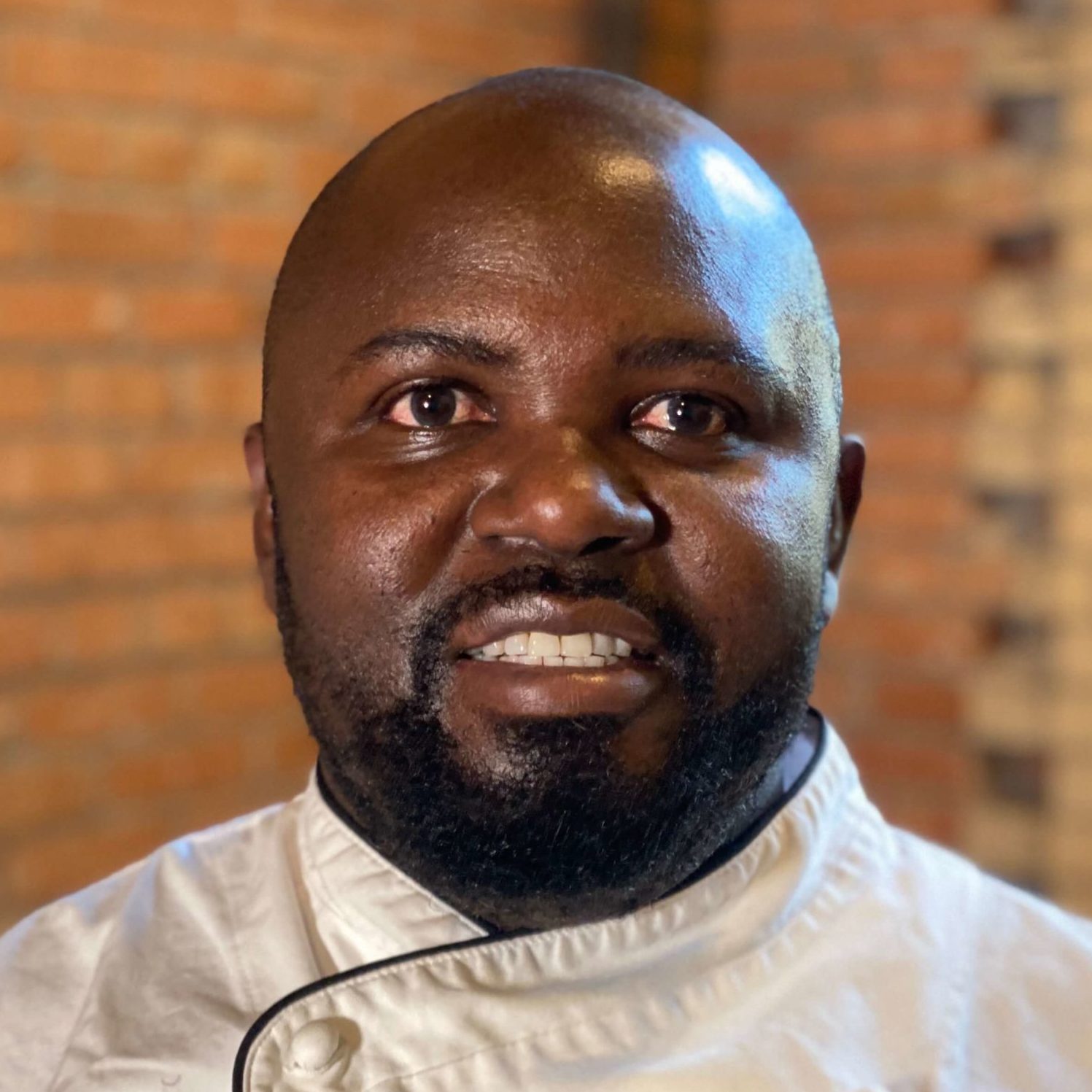 “The quality of Chef Instructors is so good. They really join hands with you one-on-one. I could reach out to any Chef Instructor whenever I needed. It’s never-ending, I keep learning each and every time I am in need of knowledge from Escoffier.”*
“The quality of Chef Instructors is so good. They really join hands with you one-on-one. I could reach out to any Chef Instructor whenever I needed. It’s never-ending, I keep learning each and every time I am in need of knowledge from Escoffier.”*

